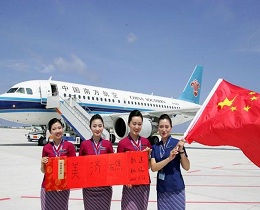
China has flown a long range bomber over the disputed Spratly islands and commissioned two naval supply ships, reinforcing its intent to deepen its anchorage in the South China Sea (SCS), in defiance of Tuesday’s ruling by an international arbitral tribunal in The Hague.
The Chinese website mil.huanqui.com is reporting that that two large supply ships, Honghi and Luomahu, of 20,000 tonnes each, were commissioned on Friday at an unnamed naval port in the Guangdong provinceTypically, supply ships replenish warships, far away from the coast, signaling China’s intent to maintain a durable naval presence in the high seas.
Strategic bomber
Besides, the same website is reporting that the Chinese air force has published a picture of its modern H-6K strategic bomber overflying the Scarborough shoal in the Spratly islands, which is in the cross-hairs of a dispute between China and the Philippines. The H-6K is a long range bomber, with a nuclear capability, which has been designed to target U.S. aircraft carrier groups.
China took effective control of the Scarborough Shoal in 2012 after a long standoff, but has not militarised it yet. Beijing’s assertion, nevertheless, triggered an alarm in the Philippines, bringing into sharper focus the military defence treaty between Manila and Washington.
More assertive response likely
The U.S. has now got the approval to establish five military bases in the Philippines. Analysts say that the militarisation of the shoal by China, which could develop an airstrip there, is likely to be viewed as a “red line,” which could lead to a more assertive response by Washington.
Chinese media is also reporting that preparations are being made to deploy floating nuclear reactors, which can be used for de-salinisation, in order to deliver ample quantities of fresh water as well as generate electricity for personnel deployed in the disputed Spratly islands. The reports, if affirmed would yet again underscore Beijing’s intent towards establishing a firmer entrenchment in the SCS.While the U.S. and Japan have been vocal in seeking compliance from China of the award, they have been unable to forge a united position across large parts of the globe.
EU statement
On Friday, the European Union issued a statement on the tribunal’s ruling, but did not make any direct reference to China, signaling divisions within the ranks of the 28-nation grouping. Reuters is reporting that Britain, France and Germany insist that Beijing must uphold international law, if it wishes to play a bigger global role. But countries, dependent on Chinese investment, such as Hungary and Greece are unwilling to take a more categorical position.
Similarly, the Asia-Europe Meeting (ASEM) that concluded on Saturday failed to make any reference to the SCS in its closing statement.The fall-out of the ruling was, however, felt in Vietnam — another country which hotly disputes China’s claims in the South China Sea. Scores of protesters were arrested in Hanoi, after they gathered in ananti-China protest in the aftermath of the tribunal’s ruling.





